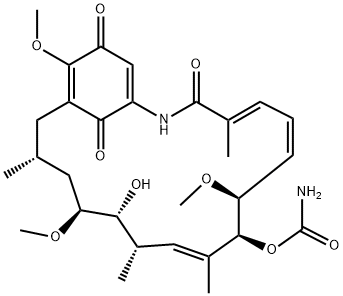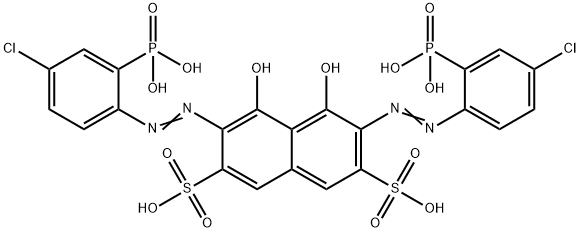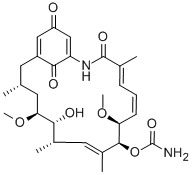Geldanamycin
Synonym(s):Geldanamycin, Streptomyces hygroscopicus - CAS 30562-34-6 - Calbiochem;NSC 122750
- CAS NO.:30562-34-6
- Empirical Formula: C29H40N2O9
- Molecular Weight: 560.64
- MDL number: MFCD00274570
- EINECS: 999-999-2
- SAFETY DATA SHEET (SDS)
- Update Date: 2024-11-19 20:33:22

What is Geldanamycin?
Description
Geldanamycin from Streptomyces hygroscopicus.
Geldanamycin is a benzoquinone ansamycin antitumor antibiotic. Geldanamycin binds specifically to Hsp90 (Heat Shock Protein 90) and to its endoplasmic reticulum homologue GP96. The Hsp90 chaperone is required for the activation of several families of eukaryotic protein kinases and nuclear hormone receptors, many of which are proto-oncogenic and play a prominent role in cancer. The geldanamycin antibiotic has antiproliferative and antitumor effects, as it binds to Hsp90, inhibits the Hsp90-mediated conformational maturation/refolding reaction, and results in the degradation of Hsp90 substrates. Hsp90 also plays a key role in regulating the physiology of cells exposed to environmental stress and thus, geldanamycin interferes with cellular stress response.
Geldanamycin was found to be a potent antibiotic active at nanomolar concentrations against 60 cell lines as well as in mouse tumor models.
It is an inhibitor of proto-oncogenic protein kinases, such as erbB22, EFG receptor tyrosine kinases, and non-receptor tyrosine kinases, such as v-src and Raf-1. In addition, it is a potent inhibitor of the nuclear hormone receptor family including the estrogen and androgen hormone receptors.
Description
Geldanamycin is a benzoquinone ansamycin antibiotic which binds heat shock protein 90 (Hsp90) and its paralog GRP94, altering their actions. Through its interaction with these chaperones, geldanamycin indirectly affects numerous client proteins with roles in diverse cellular processes, including gene expression, cell proliferation, apoptosis, and angiogenesis. For example, geldanamycin inhibits c-
Chemical properties
Yellow to Orange Powder
The Uses of Geldanamycin
Geldanamycin is a potent antitumor antibiotic active at nanomolar concentration against 60 cell lines. It binds specifically to the heat shock protein Hsp90 and to its endoplasmic reticulum homologue GP96, and thus interferes with conformational maturation of proteins and the cellular stress response. In addition, it is a potent inhibitor of the nuclear hormone receptor family.
The Uses of Geldanamycin
Geldanamycin is benzoquinone ansamycin antibiotic isolated from Streptomyces hygroscopicus. It is a potent antitumour metabolite that acts by binding to the 90-kDa heat-shock protein (Hsp90) essential to maintain the conformation, stability, activity and cellular localisation of several key oncogenic proteins such as ERBB2, C-RAF, CDK4, AKT/PKB, steroid hormone receptors, mutant p53, HIF-1α, survivin and telomerase hTERT.
The Uses of Geldanamycin
Geldanamycin?binds to and inhibits the cytosolic chaperone functions of heat shock protein 90 (HSP90). HSP90 maintains the stability and functional shape of many oncogenic signaling proteins. It interferes with conformational maturation of proteins and the cellular stress response. In addition, it is a potent inhibitor of the nuclear hormone receptor family.
What are the applications of Application
Geldanamycin is an inhibitor of HSP 90 and nuclear hormone receptor family
Definition
ChEBI: An ansamycin consisting of a 19-membered macrocyle incorporating a benzoquinone ring and a lactam functionality. It shows antimicrobial activity against many Gram-positive and some Gram-negative bacteria.
General Description
Chemical structure: benzenoid
Biological Activity
Selectively inhibits heat shock protein 90 (Hsp90). Binds to the ATP site of Hsp90 (K d = 1.2 μ M) and inhibits its chaperone activity. Consequently inhibits activities of oncogenic kinases (e.g. src, Raf), p53 and steroid receptors.
Biochem/physiol Actions
Primary Targetpc60c-svc tyrosine kinase
storage
+4°C
References
1) Neckers et al. (1999), Geldanamycin as a potential anti-cancer agent: its molecular target and biochemical activity; Invest. New Drugs, 17 361 2) Zang et al. (2006), HSP90 protects apoptotic cleavage of vimentin in geldanamycin-induced apoptosis; Mol. Cell. Biochem., 281 111
Properties of Geldanamycin
| Melting point: | 255 °C |
| Boiling point: | 627.87°C (rough estimate) |
| Density | 1.2443 (rough estimate) |
| refractive index | 1.5800 (estimate) |
| Flash point: | 87℃ |
| storage temp. | -20°C |
| solubility | DMSO: soluble |
| form | powder |
| pka | 8.42±0.70(Predicted) |
| color | yellow to orange |
| λmax | 305nm(MeOH)(lit.) |
| Stability: | Stable for 2 years from date of purchase as supplied. Solutions in DMSO may be stored at -20°C for up to 3 months |
| CAS DataBase Reference | 30562-34-6(CAS DataBase Reference) |
Safety information for Geldanamycin
| Signal word | Warning |
| Pictogram(s) |
 Exclamation Mark Irritant GHS07  Health Hazard GHS08 |
| GHS Hazard Statements |
H227:Flammable liquids H303:Acute toxicity,oral |
| Precautionary Statement Codes |
P403+P235:Store in a well-ventilated place. Keep cool. |
Computed Descriptors for Geldanamycin
Geldanamycin manufacturer
New Products
(S)-3-Aminobutanenitrile hydrochloride 4-Methylphenylacetic acid N-Boc-D-alaninol N-BOC-D/L-ALANINOL Tert-butyl bis(2-chloroethyl)carbamate 3-Morpholino-1-(4-nitrophenyl)-5,6-dihydropyridin- 2(1H)-one Furan-2,5-Dicarboxylic Acid Tropic acid 1-Bromo-3,5-Di-Tert-Butylbenzene S-2-CHLORO PROPIONIC ACID ETHYL ISOCYANOACETATE 2-Bromo-1,3-Bis(Dimethylamino)Trimethinium Hexafluorophosphate 4-IODO BENZOIC ACID 3-NITRO-2-METHYL ANILINE 1-(2,4-DICHLOROPHENYL) ETHANAMINE (2-Hydroxyphenyl)acetonitrile 4-Bromopyrazole 2-(Cyanocyclohexyl)acetic acid 4-methoxy-3,5-dinitropyridine 1-(4-(aminomethyl)benzyl)urea hydrochloride 2-aminopropyl benzoate hydrochloride diethyl 2-(2-((tertbutoxycarbonyl)amino) ethyl)malonate tert-butyl 4- (ureidomethyl)benzylcarbamate Ethyl-2-chloro((4-methoxyphenyl)hydrazono)acetateRelated products of tetrahydrofuran








You may like
-
 Geldanamycin 97% (HPLC) CAS 30562-34-6View Details
Geldanamycin 97% (HPLC) CAS 30562-34-6View Details
30562-34-6 -
 Geldanamycin CAS 30562-34-6View Details
Geldanamycin CAS 30562-34-6View Details
30562-34-6 -
 Geldanamycin 95% CAS 30562-34-6View Details
Geldanamycin 95% CAS 30562-34-6View Details
30562-34-6 -
 Geldanamycin from Streptomyces hygroscopicus CAS 30562-34-6View Details
Geldanamycin from Streptomyces hygroscopicus CAS 30562-34-6View Details
30562-34-6 -
 1975-50-4 98%View Details
1975-50-4 98%View Details
1975-50-4 -
 2-HYDROXY BENZYL ALCOHOL 98%View Details
2-HYDROXY BENZYL ALCOHOL 98%View Details
90-01-7 -
 14714-50-2 (2-Hydroxyphenyl)acetonitrile 98+View Details
14714-50-2 (2-Hydroxyphenyl)acetonitrile 98+View Details
14714-50-2 -
 118753-70-1 98+View Details
118753-70-1 98+View Details
118753-70-1